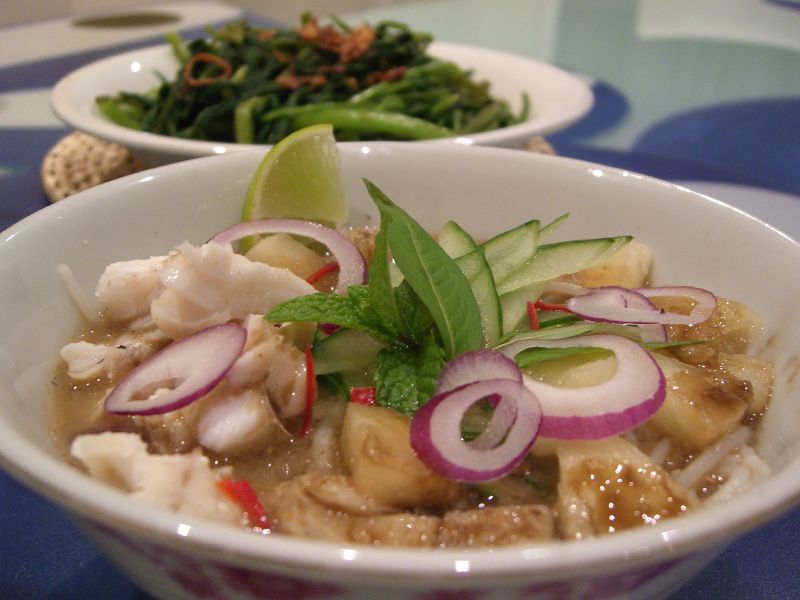















| 在這裡增加你的備註。 - yuhsuan chen | ||

Gambar Hiasan




Abu Mas'ud 'Uqbah bin 'Amr al-Ansari al-Badri, radiyallahu 'anhu, reported that the Messenger of Allah, sallallahu 'alayhi wasallam, said:
"Among the things that people have found from the words of the previous prophets was: 'If you feel no shame, then do as you wish.'"
[Al-Bukhari]
Possible interpretations of the text
Due to the form of the text, it may be interpreted in many possible meaningful ways. Imam Ibnu Rajab pointed out two interpretations of the text according to early scholars:
First interpretation: If you have no modesty, then do whatever you wish and Allah will punish you for what you do.
This mode of expression is well known in the Arabic language, and it is used for threatening someone. This mode is used by the Qur'an in Surah Fussilat: ayat 40.
Second interpretation: If you are contemplating an act and it is an act such that there is no reason to be ashamed of doing it before Allah or the people, then you may do that act.
Modesty is used as a criterion over whether or not to do a certain act. The command here is in the form of displaying permission.
However, there is a valid third interpretation given by Ibnu al-Qayyam who is a scholar from the eighth Hijrah century. He is in the view that the command is not what is meant by this statement. Instead, it is a statement of fact. The meaning is: If a person does not have any modesty, then there is nothing to prevent him/her from doing anything.
Haya' is one of the most important factors that keeps a person from committing a sinful act. If a person has no haya', he/she will do almost anything.
Haya' or modesty is a great Islamic concept that leads to goodness and keeps a Muslim away from doing a bad or indecent act when its level is maximized. Treating bad actions, as shown by revelation, as evil acts and feeling ashamed of Allah to do it and ashamed of the community, are ways of acquiring haya'. Iman and haya' are linked. When there is iman, there is haya', and vice versa. All of us are borne with natural haya'. However it is subject to be spoiled due to environment and dominating ideologies. Technology misuse has its negative and destructive impact on haya'. Muslims need to be aware of such challenges and exert their effort to overcome them. Haya' cannot be used as an excuse for not doing good deeds and acts.
********
Semalam, 20/11/08,usrah kat rumah Izzah semua. Kak Syude kupaskan hadith ni,yg aku rasa agak menarik. Berkenaan dengan malu.
Dalam komuniti melayu khususnya, kita sangat sinonim dengan malu
"malu tak kena tempat"
"malu bertanya kawan,sesat cari jalan pulang"
"tak tau malu"
Selama hampir 3 tahun belajar dekat dublin ni, memang pelajar2 melayu ni antara yang pemalu. malu nak bertanya pada lecturer. termasuk la aku. (tapi aku lebih kepada malas). pelajar melayu diam jer dalam kelas dan mingle sesama sendiri. ini tak dapat dielakkan sebab hampir 35% pelajar didalam kelas pun bebudak malaysian. tpi bile bebudak PMC(twinning) ni balik march ni,memang akan surut la malaysian. kena la mingle dengan dengan Irish mates n n international student yg lain.
Berbalik isu malu. Kadang-kadang ni, malu tu subjektif. Ada sesetengah org ni, memang tak tau malu la. extrovert. expressive.tak tau malu bukan in a negative way la. diorg senang mingle dengan org lain. easy going. senang ramah. people person la kata org.
Ada plak yg mmg pemalu la.contohnya aku. eh,betula la. try tanya dr aziz. malu nak start conversation. malu nak bertanya. malu nak luahkan isi hati. tpi ni dgn org yg aku tak biasa dan tak rapat. tp kalu dah rapat, no hal.
tapi kadang2,aku sedih dgn org tak tau malu in a negative way. seolah-olah bangga dengan benda2 yang mmg dilarang dalam Islam.hairan pun ada.mungkin diorang masih tidak memahami al-haya'.aku doa sangat aku dihindar dr benda2 yg maksiat dan berdosa, sbb tidak mungkin andai Allah palingkan hati ini (nauzubillah), aku mungkin akan jadi org yg tidak tau malu dalam berbuat dosa (nauzubillah).


 Lecture tukar lagiii!!!
Lecture tukar lagiii!!!
On the authority of Abu Sa'id al-Khudri, radiyallahu 'anhu, who said: I heard the Messenger of Allah, sallallahu 'alayhi wasallam, say:
"When any one of you sees anything that is disapproved (of by Allah), let him change it with his hand. If he is not able to do so, then let him change it with his tongue. And if he is not able to do so, then let him change it with his heart, though that is the weakest (kind of) faith."
[Muslim]
The last portion of the hadith clearly states that the least a Muslim can do in the case of witnessing an evil act is to change it by his/her heart. This means that he/she should dislike the evil he/she comes across. This is an action of the heart, such as saying: "O Allah, there is nothing that I can do to change this bad situation that You dislike and disapprove except that I hate it to take place. I do not agree to it. O Allah forgive me, guide me and save my heart to be influenced by it."
Unless this action of the heart is practiced, the heart of the believer who witnesses that evil will be subject to be influenced by that evil. A dark spot will be placed in that heart (as stated in another hadith related by al-Bukhari).
With the repetition of such negative attitudes, the heart will be subject to more dark spots placed in it until it is concealed and no longer appreciates what is good and no longer dislikes what is bad or evil. This means that the Muslim who does not practice the lowest level of forbidding the evil, will be subject to turn into being an evil doer him/herself.
**********
Kak Syude(my naqibah) kupaskan hadith ni during last usrah(07/11/08). Macam mana kita kena mengubah perkara mungkar selari dengan kemampuan kita.
Selama ni, yang aku termampu adalah membenci dengan hati, which is the weakest of Iman. It is really torturing whn u cant say anything to ur frens that changed.
I wish I wud have at least the lowest rank of bravery to tell them that they are changing and diverting from Islamic values. I wish I wud have the gut to say it. But, I cant.
Few days ago, something happens that i dont even want to remember it. How shock i am,knowing that A(not a real name) changed. May be i didnt know her inside out. For God's sake, I dont even have the idea that she was so brave. Sorry, but I cant tell it precisely.
I know her for 5 years. and i dont want her to be deceived by the illusion of the duniya.
O Allah, please give me the strength..

 A lecturer when explaining stress management to an audience, raised a glass of water and asked 'How heavy is this glass of water?'
A lecturer when explaining stress management to an audience, raised a glass of water and asked 'How heavy is this glass of water?'Answers called out ranged from 20g to 500g.
The lecturer replied, 'The absolute weight doesn't matter. It depends on how long you try to hold it.
If I hold it for a minute, that's not a problem.
If I hold it for an hour, I'll have an ache in my right arm.
If I hold it for a day, you'll have to call an ambulance.
In each case, it's the same weight, but the longer I hold it, the heavier it becomes.'
He continued, 'And that's the way it is with stress management. If we carry our burdens all the time, sooner or later, as the burden becomes increasingly heavy, we won't be able to carry on.'
'As with the glass of water, you have to put it down for a while and rest before holding it again. When we're refreshed, we can carry on with the burden.'
'So, before you return home tonight, put the burden of work down. Don't carry it home. You can pick it up tomorrow. Whatever burdens you're carrying now, let them down for a moment if you can.'
So, my friend, put down anything that may be a burden to you right now. Don't pick it up again until after you've rested a while.
Here are some great ways of dealing with the burdens of life:
* Accept that some days you're the pigeon, and some days you're the
statue.
* Always keep your words soft and sweet, just in case you have to eat
them.
* Always read stuff that will make you look good if you die in the middle
of it.
* Drive carefully. It's not only cars that can be recalled by their maker.
* If you can't be kind, at least have the decency to be vague.
* If you lend someone $20 and never see that person again, it was probably worth it.
* It may be that your sole purpose in life is simply be kind to others.
* Never put both feet in your mouth at the same time, because then you won't have a leg to stand on.
* Nobody cares if you can't dance well. Just get up and dance.
* Since it's the early worm that gets eaten by the bird, sleep late.
* The second mouse gets the cheese.
* When everything's coming your way, you're in the wrong lane.
* Birthdays are good for you. The more you have, the longer you live.
* You may be only one person in the world, but you may also be the world to one person.
* Some mistakes are too much fun to only make once.
* We could learn a lot from crayons... Some are sharp, some are pretty and some are dull. Some have weird names, and all are different colors, but they all have to live in the same box.
*A truly happy person is one who can enjoy the scenery on a detour.


credit to www.hafizismail.net

Winter at my place
-Al Maidah:105
'O believers! Take care of yourselves. He, who has gone astray, will not harm you when you are on the right way. Towards Allah is the return of you all, then He will tell you what you were doing.